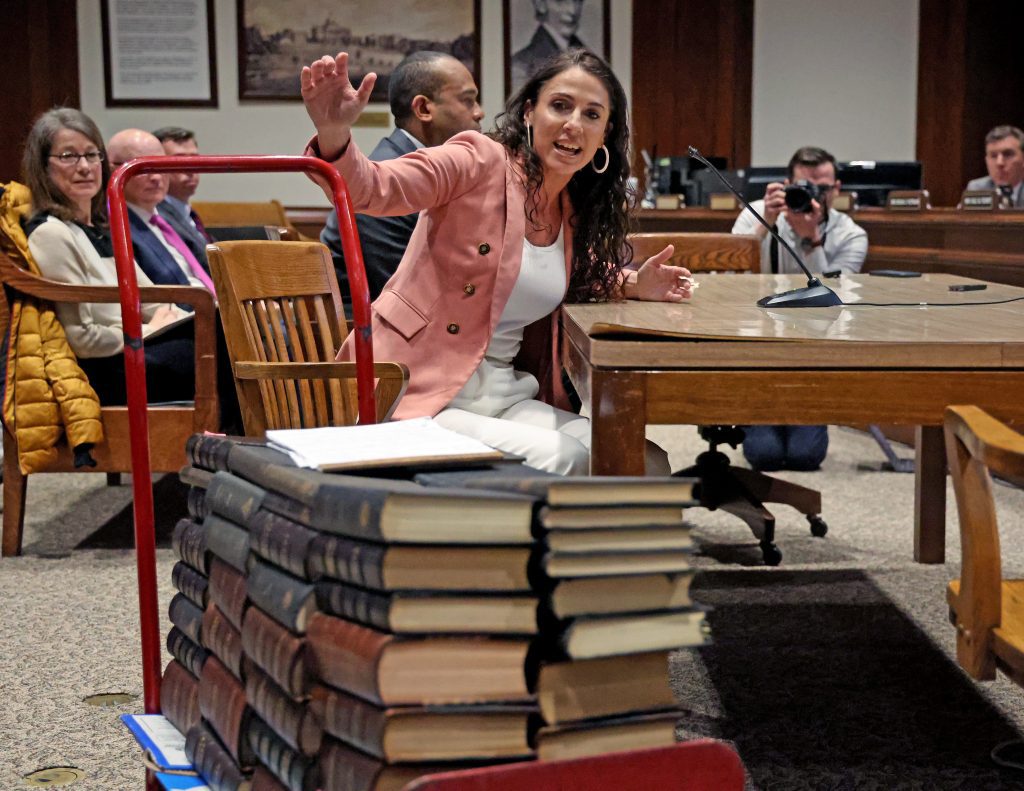A dispute over a plan to increase the authority of the state auditor to examine the Legislature became heated on Tuesday when State Auditor Diana DiZoglio defended her proposal from various critics who questioned if it violated separation of power principles in the state constitution.
Temperatures rose as DiZoglio defended a suggested ballot initiative that would give her office the power to investigate the Legislature’s finances, a move that two academic experts described as an 'old-fashioned power grab' and likely to face legal challenges.
DiZoglio spared few legislative officials on Beacon Hill as she criticized them for refusing to cooperate with an audit her office has been trying to conduct into the internal proceedings, finances, rule creation, and details on active and pending legislation.
“At some point, this body will need to confront the reality regarding these false arguments being perpetuated by the (legislative) leadership team because the taxpayers of Massachusetts are more discerning than they are currently being treated,” she said. “They're the experts on the issue.”
Attorney General Andrea Campbell determined in November that DiZoglio was not legally authorized to conduct an audit of the Legislature without their consent. DiZoglio was then left to pursue the matter through a ballot proposal and has since overcome multiple gathering obstacles.
But the likelihood of the proposal being successful on Beacon Hill is low.
Rep. Alice Peisch, a Wellesley Democrat and co-chair of the committee responsible for examining potential ballot questions, stated that it is “highly unlikely” to pass the Legislature by itself. If the Legislature does not act, supporters will have to gather more signatures from voters to get the November ballot access.
“(It is) evident from the testimony we’ve heard today, both expert and otherwise, including some of the supporters of the question, that this particular question does raise some serious constitutional issues and that’s something we are going to have to take into consideration,” Peisch said.
Two constitutional law academics, who were invited to testify by the chairs of a committee reviewing potential ballot questions, criticized DiZoglio’s efforts to gain additional authority to audit the House and Senate.
David King, a senior lecturer in public policy at the Harvard Kennedy School, said the change in law DiZoglio is proposing could “seriously harm the balance of powers between the Legislature and the executive branch.”
“Disguised as a call for transparency and accountability, the maneuver appears to be like an old-fashioned power grab,” King told lawmakers. “The auditor’s maneuver would shift power away from the Legislature into the unchecked hands of the executive branch. In my view, and from my understanding of history, (the proposal) is a power grab — straightforward and unrefined. It is precisely what John Adams and the founders cautioned against.”
DiZoglio did not react well to the criticisms from King, who heads a bipartisan program for newly elected members of Congress. In a tense exchange with Rep. Kenneth Gordon, DiZoglio said lawmakers invited “so-called experts, as intelligent as they may be,” to testify at the hearing.
DiZoglio said that the people who have been ignored by the state Legislature are the real experts, not the ones chosen by the committee for a political show.
Gordon argued that the first two speakers were State Comptroller William McNamara and an accountant for a firm that audits the Legislature. He also mentioned that he contacted Northeastern University to find a constitutional law expert.
The Bedford Democrat explained that he only spoke to one professor, who is present to speak. He clarified that he did not tell anyone not to speak, and everyone has the right to their own opinion.
Peisch and Sen. Cindy Friedman, the other co-chair of the committee reviewing ballot questions, said they typically consult local colleges and universities to find experts for multiple hearings.
Rep. Michael Day, a Stoneham Democrat and co-chair of the Judiciary Committee, stated that no one else has accused the committee of selectively choosing experts.
Political Science Professor Jerold Duquette from Central Connecticut State University expressed uncertainty when DiZoglio disregarded the expertise of the attorney general, a former auditor, and every political science professor he could find.
Duquette commented that it is concerning to dismiss expert opinions and embrace anti-intellectual sentiments, which are not needed in Massachusetts or the country as a whole.
Former State Auditor Susan Bump, who supported DiZoglio’s opponent in the 2022 election, raised doubts about the impartiality of her successor for a potential legislative audit due to past conflicts with Democratic leaders in the House and Senate.
Bump stated that the strong advocacy of DiZoglio's agenda makes it unlikely that she can maintain the necessary objective and nonideological stance of an auditor. According to Bump, DiZoglio's goal is clearly to gain the power to change the operations of the state Legislature.









